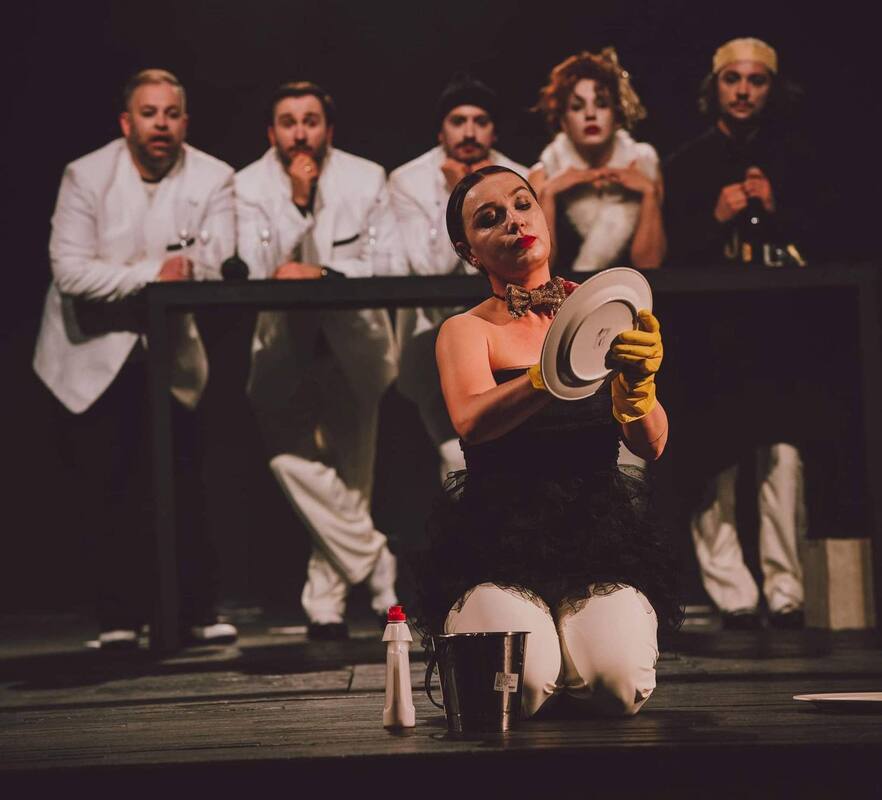Review by Fatlinda Daku In search of a better life. Going in to the theatre, all I knew about Jeton Neziraj's Kosovo for Dummies was that it was about a young girl who goes to Switzerland. So what? I thought, I have cousins and friends who went there. It's nothing new. But Neziraj's play, ably directed by Blera Neziraj, turned out to be one of the most interesting and relevant performances I have ever seen. The kind of performance that you want to call your friends and tell them about after you leave. Over an hour and a half, it explores the current situation in Kosovo, the past two decades and more in a very clear way. The text may not be new but it remains necessary. If it were played 15 years ago, the same would still be true. Why is this? Every year many young people leave Kosovo to go to countries that offer them what our country cannot. We all see this, we all feel bad, we all call on those in power not to go on repeating the famous saying: "Youth is the future of Kosovo." And this is the end of the discussion usually. Nothing more is said about it. Who is to blame? Politicians? Universities? Those who leave? All of us? We have discussed and debated these questions many times and all those who are reading this will most likely have an answer to this question. But we often forget to ask what happens to the young people of our country who go to another country, what happens to them there? Are they really finding a better life? Neziraj's text deals with this directly. Blerta Neziraj's production makes us, the spectators, travel without visas to closely follow the life of Antigona, a young girl, who like many others has migrated to Switzerland. She finds a job in a Turkish kebab shop which many people in Switzerland frequent for the famed donners they make. But, apparently, even there they don't let you enjoy your life. Antigona must appeal to an institution to retain her residence permit and acquire certificates to prove that she is a 'normal' person. In addition to the suitcase full of certificates that are usually required of migrants, she must prove that she is not a rhinoceros. Only Mr.Hartman, a 100% Swiss guy who works in this institution knows what 'normal' means. He gives her a deadline of a few days to find that certificate. Antigona desperately returns to the kebab shop where she works to tell them the sad news and ask for help. A regular client who loves Albanians very much promises Antigona that he will go to Kosovo and will find the certificate that proves she is not a rhinoceros. When he arrives in Kosovo, the scene becomes hazy and messy as if this explains the aggravated mental state of the young people there. Her customer looks everywhere for this certificate and constantly tells the people of Kosovo how much he loves them and how much he wanted to come to this country. After a while, he finds this certificate and with this, Jeton Neziraj seems to ironically imply that in this country you can always find a solution and what you are looking for, if what you want is to leave this place, but there is no help for you if you continue to live there. The play contains two other key characters. The owner of the kebab shop and a lady with a dog. They symbolize the two other types of people you meet when you live abroad. The lady with the dog is completely indifferent to your existence and does not care whether or not you are a migrant. But you can also meet strangers like you who understands your situation and give you a job and maybe even a place to stay because they feel your pain.. You can also meet people who go to Kosovo for you to prove that you are a 'normal' person as well as those who force you to show that you are not a rhino. The History of the Rhinoceros What is a rhinoceros? They are animals with two horns on their faces, directed at you, getting ready to charge - and, most importantly, giving you the chance to act. They are animals so unknown to us they are almost mystical, and Neziraj tells us that they are sometimes found inside us too, whether you are a migrant or not. Towards the end of the play, a rhino enters the stage, removes their mask, and looks at us, at the public, telling us a story about Syrian migrants in Kosovo. The Rhinoceros says that one day she got the courage to talk to one of them and hear the story of their lives. The migrant felt so good following this conversation that he had thanked her endlessly for listening to him. The rhinoceros was reminded of the past and the years of war when they themselves were in a similar position. The rhinoceros tells us that we should listen more and be more empathetic. The moral of the story The play deals with three things at once. A young woman fleeing from Kosovo to Switzerland for a better life. Another one coming to Kosovo for a better life and another who has emigrated and returned to Kosovo again. The play clearly shows the social inequality that all of them experience regardless of where they come from and the double standards along with the hidden racism that some have inside them. As with his other plays, Jeton Neziraj's satire makes us think twice about our behavior and makes us reflect on the social problems we have in our country. Because if we do not reflect, the rhino will stay with us for a long time.
0 Comments
|
Kosovo Theatre ReviewsReviews and creative responses to theatre productions in Kosovo Archives
November 2022
Categories |

 RSS Feed
RSS Feed
